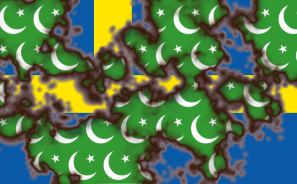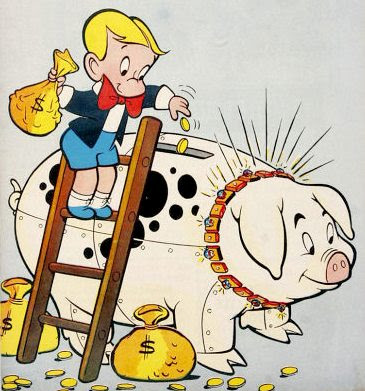It’s a pleasure to introduce our new Swedish correspondent PMP to Gates of Vienna readers. In his first essay for us, PMP takes a look at the culture of self-hatred that has arisen in Sweden in recent decades, as reflected in the masochistic celebration of the country’s National Day.
 Sweden’s National Day (of self-loathing)
Sweden’s National Day (of self-loathing)
by PMP
By studying how Swedish politicians and media ideologically attack Sweden on its own National Day, this essay will reveal how Sweden has ceased to exist as a proud and tolerant nation. It will show how an anti-nationalist, Marxist line of thought is being propagated all the way from top officials, including the Royal Family, to the vast majority of Sweden’s various media outlets and research institutions.
In his essay, ‘The Case of Sweden’, Fjordman spoke of the country as a nasty and ‘frightening example of Political Correctness and self-loathing and can as such serve as a warning to others’. He also noted that Sweden is self-destructing at an unprecedented pace, for example referring to how Swedes will become an ethnic minority in their own lands within a few decades. Whilst this is very likely, the deconstruction is not only happening in terms of physical immigration and demographic changes. It is also about the deconstruction of traditional Swedish values and perceptions.
We are talking about a monster, with tentacles consisting of journalists, politicians, officials and researchers.
An unfortunately superb time to witness this beast appear out of the dark is when it annually seeks to attack Sweden’s National Day, which takes place around the 6th of June. Every year during this day we are reminded of how far the establishment and media have pushed their ‘anti-indigenous’ agenda. This day is, apparently, a great time to criticise exactly what the day is intended to celebrate — being Swedish and being proud of Sweden.
In the case of Sweden, there are many past examples of a type of dislike and critique of being Swedish. The former leader of the Social Democrats, Mona Sahlin, expressed this at a conference, stating that she could ‘not think of anything resembling Swedish culture.’ And that this further ‘makes Swedes jealous of immigrants who have a culture, identity and a history which unite them.’ This, ‘whilst Swedes only have midsummer celebration and such ridiculous things.’
The current prime minister of Sweden, Fredrik Reinfeldt of the Moderate Party (‘Conservatives’ in Sweden), stated in 2006 that ‘the only feature of Swedish culture is barbarism, whilst everything else is thanks to immigration’.
The list of such statements is lengthy, especially when studying the writings of the country’s journalists. If one looks at how the establishment is tightly inter-linked politically with the media, the large amounts of this criticism does make sense. The celebrated anonymous author Julia Caesar has written about the bias of the Swedish media. She means that, whilst around 40% of the Swedish population sympathizes with the red-green (left) parties of the country, those holding such views make up at least 70% of Sweden’s journalists. According to a study by professor Kent Asp of Gothenburg University, 56% of Swedish journalists sympathise with the extreme left party ‘Vänsterpartiet’, and 41% with the Environmental Party. According to Asp, however, the State-funded television and radio, SVT and SR, win by far — over 83% of their journalists sympathise with these two leftist parties.
Let’s break this Nation down
Thus, to witness politicians, journalists and researchers arguing a line of cultural deconstruction on the country’s National Day should not come as a surprise. And so they did. On National Day the media did not make us wait for this criticism. On the early morning news, Channel 4 launched a ‘discussion’, on the topic ‘What is Swedishness? Is there such a thing?’. There were three participants in the discussion — None of whom viewed themselves as ‘ Swedish’. The TV show’s host asked whether if they felt the day meant anything special to them, resulting in their bursting into laughter. One of them, Qaizar Mahmood, said that he ‘wished it might mean something, but it really didn’t.’ Mahmood then went on to describe Swedishness as an onion, made out of different layers. One of these layers, was ‘the passivity (read cowardice) of the Swedes, which was shown during WWII,’ when Sweden did not take a stand against the Germans. He continued, asserting that ‘There are new layers constantly added to this onion, but if you peel these off, there is no core of Swedishness or of being a Swede.’ In other words, there is nothing to celebrate as there is nothing or no one who is Swedish in the end.
This line of thinking finds expression in every source of journalism during this day. The journalist Jan Anders Olsson called for using the National Day as a ground for fighting ‘hate-crimes’. ‘The terms ‘Swede’ and ‘Swedishness’ in principle now refer to everyone,’ he argued. Therefore, ‘the National Day serves the function to remind us that all who hold a Swedish citizenship are de facto Swedes’. Christian Fernandez and Anders Hellström, researchers at Malmö University, called for making the National Day the ‘Day of Citizenship’. They meant we need to construct and celebrate an ‘Us’ which rejects the current, narrow understanding of ‘Swedishness’. In a chronicle in one of Sweden’s major evening papers, Aftonbladet, Elisabeth Höglund criticised the use of Sweden’s national anthem. Höglund meant the song expressed imperialism and brutal colonialism, as the song illustrates 17th century Sweden. She therefore meant that the anthem should be ‘re-written’, so that it would more correctly reflect ‘contemporary Sweden’.
Possibly the most influential Swedish news site and paper, Dagens Nyheter, has been a strong advocate of such arguments since the 1960s. A day before the National Day, the Liberal Swedish politician Jasenko Selimovic in this paper called for a ‘new Swedishness’. He compared Sweden to USA, meaning that they are very similar societies as they are made up of many different nationalities. However, he meant Sweden has failed to develop a similar sense of being Swedish, when compared to those who refer themselves to ‘American’.
If you were to ask the Swedish people whether they would like their country to be turned into a European version of the USA, I can assure you they would not approve. However, I have long since given up the thought that journalists and policy-makers such as Selimovic might actually care about what Swedes want.
This madness did not stop with journalists and academics; it also came from a more official level. I suppose The Royal Family of Sweden simply does not have much choice but to follow the political line of the establishment. For them to appear in the media celebrating being Swedish is no longer acceptable. At the National Day, parts of the Royal Family instead visited multicultural Malmö in the South of Sweden, where around 40% of the habitants are ‘non-Swedish’. In a highly covered presentation at the city’s Opera, Swedish Crown Prince Daniel welcomed the 300 so-called ‘New Swedes’ who were invited as guests. He introduced his speech stating that ‘being Swedish does not refer to skin or hair colour, nor accents’. To be Swedish, ‘is to share a place on the earth and to share a commonality and responsibility’. In the city which has recently seen an unprecedented murder-wave in Scandinavia, the Prince of course also emphasised how ‘Sweden has been enriched socially and culturally through immigration’.
Witch-hunt of nationalism — On the National Day
Other than the under-represented nationalist organisations, which are labelled as racists and fascists by media, there were virtually no journalists who opposed the propaganda during Sweden’s National Day. However, an exception which surprised many was the infamous historian Herman Lindqvist. Lindqvist is regarded by many as perhaps the most important scholar of Swedish history. As a protest to the above-illustrated attacks on the National Day, Lindqvist wrote an article titled ‘Stop puking on the National Day’. In the article, he criticised the fact that politicians and journalists cannot let Swedes even have one day a year to be proud of who they are, and where they come from. Lindqvist was then interviewed by a nationalist site about the article. On being asked whether there are ‘ethnic Swedes’, Lindqvist answered ‘of course there are’. After this, all hell break loose in the small country, and the red-green journalists could smell blood from miles away. The privately funded anti-racist institution Expo accused Lindqvist of collaborating with and supporting Nazis. The major newspaper Aftonbladet wrote an article where they now referred to Herman Lindqvist as a ‘poster-boy of organised fascism’.
In summary, the Swedish establishment, together with its branches in the media and academia, propagates a view of the country which ferociously attacks the notions of ethnic Swedes and of Swedishness. The day the population is supposed to celebrate this otherwise fantastic country, has been hijacked to serve as a political tool.
What we are talking about here is thus not a small amount of criticism from a few individuals. It is an organised body of critique, running top-down through the various levels of society. You are not to celebrate what used to be Sweden or what is Swedish. You are encouraged to question yourself, your country and your people. On the one hand, Swedes are to deny their own existence and question any notion of culture. On the other hand, they are to respect and admire people from other cultures who, in contrast to their Swedish ancestors, have enriched the country. This privilege obviously does not extend to the Swedes themselves. If you do not agree with this, you apparently deserve to be hunted down and harassed. To avoid being labelled a fascist and racist you had best make sure you loathe your own background and people as much as possible.
I have however not given up on the Swedish people itself. I know that a high percentage of ordinary Swedes celebrate the day and share the richness of what the country has brought them. The disturbing thing is to see how the politicians, who are supposed to represent these individuals, have their own agenda which has not been wished for by the population as a whole.
At the end of the day, I wonder: Did the Swedes really want to elect politicians who try to deconstruct their country?
Did they want an establishment which denies their existence, and encourages them to despise themselves on their only day of celebration?

 A 26-year-old Chinese soccer fan died of exhaustion after staying awake for eleven days straight to watch the European soccer finals on television. Some sources say that tobacco and alcohol, in addition to sleep deprivation, were causative factors in his death.
A 26-year-old Chinese soccer fan died of exhaustion after staying awake for eleven days straight to watch the European soccer finals on television. Some sources say that tobacco and alcohol, in addition to sleep deprivation, were causative factors in his death.



